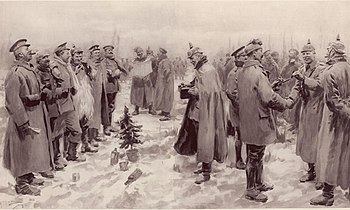Wow! Today is Christmas Eve. December seems to have already come and gone. I am looking forward to a ministry call today and some time in the kitchen preparing a feast for tomorrow. I am sitting at my desk with a large mug of Door County White Christmas Coffee. Both of our dogs are sound asleep as well as my wife. It is time to write.
Luke 2:14 Glory to God in the highest, and on Earth peace, and good will toward men.
Credit Wkipedia
Below I have copied some historical information from World War 1. It is the recount of the Christmas Truce of 1914. Two things are noteworthy here. In 1914 it doesn't really tell us which side of the battle initiated the truce. Both sides were sick of the fighting. Whoever made the first contact of peace is not known. But whoever it was made the first step. The second noteworthy item is that the peace didn't last. Those desiring more war moved on and the war became more fierce with huge atrocities occurring. I have studied this truce for many years and I find hope in knowing that within hearts at war there is still a desire for peace. For some they have hardened their hearts.
My point is this. Many families and friends are split these days with battles over who knows what. Each day that the battles go on the intensity rises and rage becomes more common and all too often over nonsense and small irritations. I am suggesting a Christmas present that you can give yourself . If you are in a personal war with your family or friends, declare a truce. Come together and pray. Ask God to be the thread in your garment of peace. Be the first to specifically own your part whether the other party does also or not. Cross the trench of your battle and embrace your enemy. You might just see that you were fighting over things that really don't matter.
In the article below, some chose to fight on and not participate in a truce. Let me suggest this. Knowing war and it's outcomes, someone was wounded or killed on Christmas day 1914 and never celebrated Christmas that year or ever again. Now hopefully your battle does not lead to atrocities. But if you insist on being a family or friend warmonger it will wound hearts for a long time and this is a Christmas you will miss. No matter what circumstances cause you to fuel your anger, rage or plain old nastiness, they don't justify being at war with family, friends or your yourself.
Give the gift of peace today or tomorrow and let it begin with you!
God Bless,
Marty
Christmas truce
The Christmas truce (German: Weihnachtsfrieden; French: Trêve de Noël) was a series of widespread unofficial ceasefires along the Western Front of World War I around Christmas 1914.
The truce occurred during the relatively early period of the war (month 5 of 51). Hostilities had lulled as leadership on both sides reconsidered their strategies following the stalemate of the Race to the Sea and the indecisive result of the First Battle of Ypres. In the week leading up to the 25th, French, German, and British soldiers crossed trenches to exchange seasonal greetings and talk. In some areas, men from both sides ventured into no man's land on Christmas Eve and Christmas Day to mingle and exchange food and souvenirs. There were joint burial ceremonies and prisoner swaps, while several meetings ended in carol-singing. Men played games of football with one another,[1] creating one of the most memorable images of the truce. Fighting continued in some sectors, while in others the sides settled on little more than arrangements to recover bodies.
The following year, a few units arranged ceasefires but the truces were not nearly as widespread as in 1914; this was, in part, due to strongly worded orders from the high commands of both sides prohibiting truces. Soldiers were no longer amenable to truce by 1916. The war had become increasingly bitter after devastating human losses suffered during the battles of the Somme and Verdun, and the use of poison gas.
The truces were not unique to the Christmas period, and reflected a mood of "live and let live", where infantry close together would stop overtly aggressive behaviour and often engage in small-scale fraternisation, engaging in conversation or bartering for cigarettes. In some sectors, there were occasional ceasefires to allow soldiers to go between the lines and recover wounded or dead comrades; in others, there was a tacit agreement not to shoot while men rested, exercised or worked in view of the enemy. The Christmas truces were particularly significant due to the number of men involved and the level of their participation—even in very peaceful sectors, dozens of men openly congregating in daylight was remarkable—and are often seen as a symbolic moment of peace and humanity amidst one of the most violent events of human history


No comments:
Post a Comment